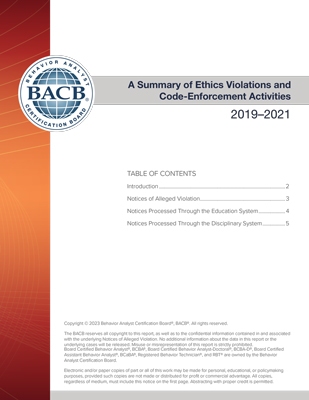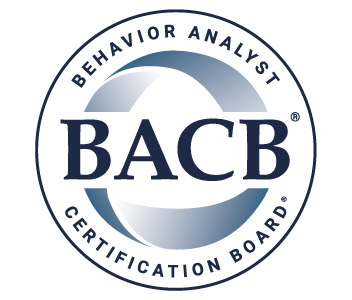The BACB cannot provide legal or ethics advice under any circumstances. There are a number of resources available for anyone seeking guidance related to ethics in the Ethics Resources section. U.S. residents of states that regulate the practice of behavior analysis may contact their state disciplinary boards. For more information about regulation in the … Continue reading “ETHICS CODES”

The 2019-2021 Summary of Ethics Violations and Code-Enforcement Activities is the latest summary of ethics violations and enforcement activities based on Notices of Alleged Violation received under the Ethics Code for Behavior Analysts and the RBT Ethics Code (2.0).
Ethics Toolkits The BACB’s ethics toolkits offer important information focused on helping individuals and organizations provide high-quality services in compliance with BACB ethics requirements. These easy-to-use resources can support certificants as they design needed systems and processes or evaluate existing ones. We encourage certificants to use and share these toolkits as they practice, supervise, train, … Continue reading “ETHICS RESOURCES”

Once you meet all applicable eligibility requirements, submit a certification application, and receive an approved determination, you must take and pass a BACB certification examination. You will schedule and pay for this examination through your Pearson VUE account. BACB examinations are composed of multiple-choice questions. Each question has 4 possible answers and only 1 correct answer. … Continue reading “EXAMINATION INFORMATION”
Being an RBT Supervisor can be rewarding. After all, you’re directly impacting someone’s professional development and growth! But the journey of a supervisor isn’t always a straightforward one. This blog post was made to help you navigate the difficult, unexpected parts of being a supervisor, no matter how long you’ve been doing it. Keep reading … Continue reading “When Supervising RBTs Doesn’t Go as Planned”
In a perfect world, your experience as an RBT would be free of roadblocks and complications—and for the record, we hope that it is! In reality, you might end up in a situation that could negatively impact your certification. But where there’s a problem, there’s a solution. This blog post is here to help you … Continue reading “When RBT Certification Doesn’t Go as Planned”
Nearly half of all recently certified BCBAs and BCaBAs were RBTs when they applied. What does that tell us? For many, becoming an RBT is the first step on a journey toward BCBA or BCaBA certification. Knowing this, we’d like to answer some frequently asked questions about accruing supervised fieldwork for BCBA or BCaBA certification … Continue reading “7 FAQs for RBTs Pursuing BCBA or BCaBA Certification”

On this page, employers interested in hiring applied behavior analysis (ABA) practitioners can learn more about BACB® certification and access essential resources. About BACB Certification Why it Matters For over 20 years, the Behavior Analyst Certification Board® (BACB) has been the leading credentialing organization in behavior analysis. BACB certification is valuable because it: makes it … Continue reading “Employer Resources”

On this page, consumers of behavior-analytic services, parents, caregivers, and others can learn everything they need to know about BACB® certification and access essential resources. About BACB Certification Why it Matters For over 20 years, the Behavior Analyst Certification Board® (BACB) has been the leading credentialing organization in behavior analysis. BACB certification is valuable because … Continue reading “Consumer Resources”
If you are concerned that a BACB certificant may have violated one or more of the BACB’s ethics requirements, you can report your concern to the BACB’s Ethics Department using the Notice of Alleged Violation form below. Before proceeding though, we highly recommend you use the accordions below to learn more about reporting against a … Continue reading “REPORTING ALLEGED VIOLATIONS AGAINST CERTIFICANTS”



